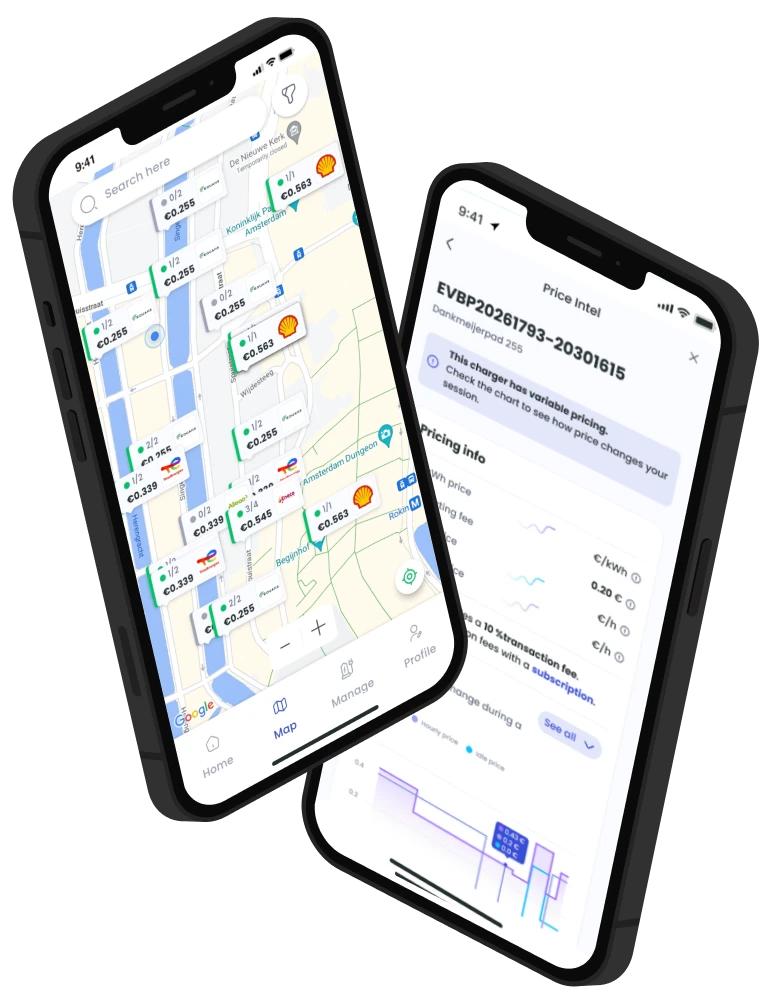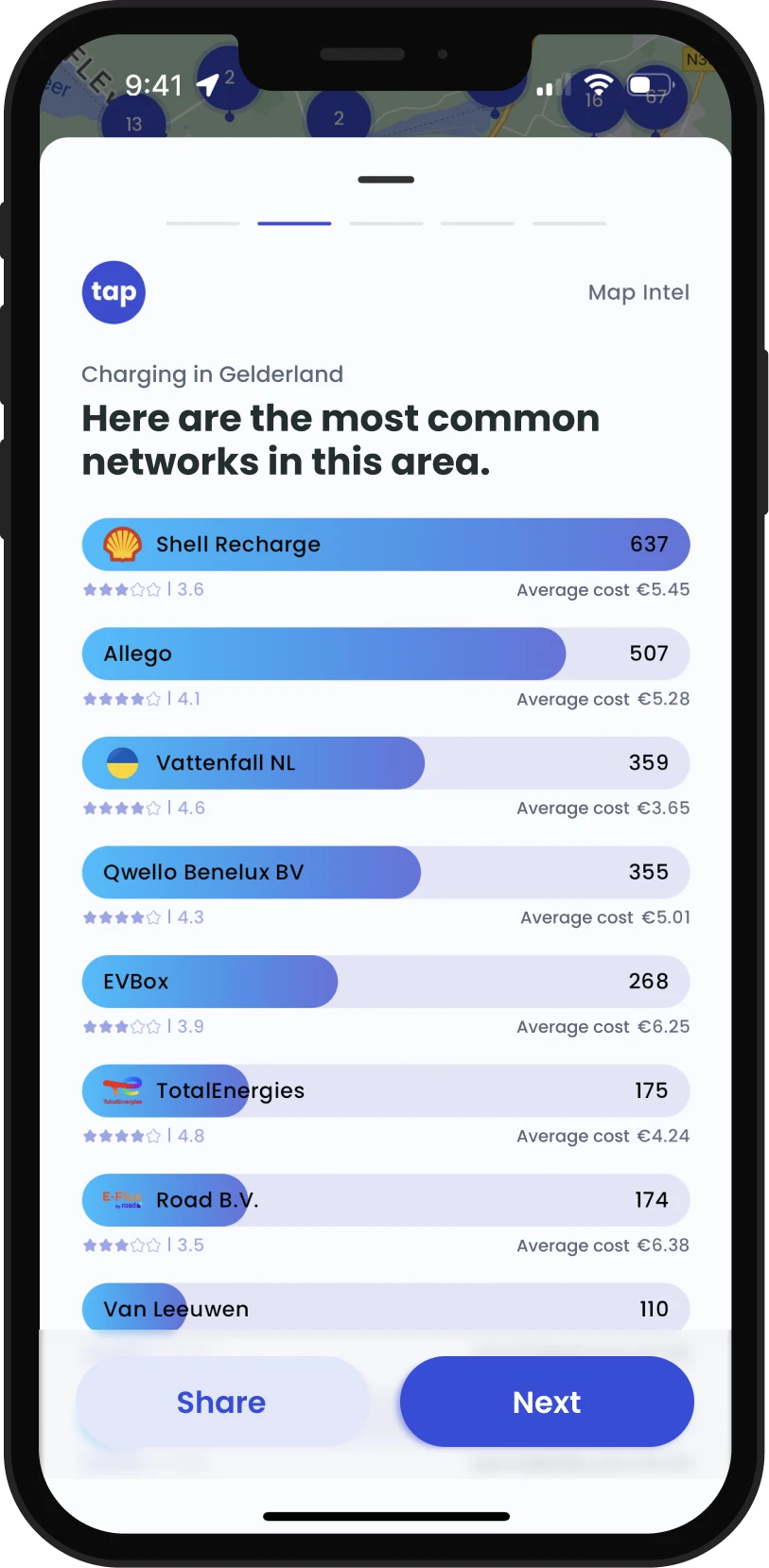Key takeaways for drivers
Important update
On January 1st, 2025, a beneficial tax rule for Dutch charge network operators expired. Some operators passed on this cost to drivers and may have impacted the cost to charge your electric car in the Netherlands
Chargers under 12 kW are usually the cheapest
These chargers typically cost between €0,33 to €0,54 per kWh, which can be cheaper than higher power chargers. While charging might take a bit longer, your savings can really add up.
On average, the price gap between cities is closing
Our research found that the average price per kWh difference between the most expensive and cheapest city has decreased from €0,21 to €0,14 since January 2025. EV drivers in Amsterdam have the lowest average price per kWh.
Charge at local prices to save more
In most cities, you can save more by using providers that pass on operator pricing like Tap. Our research found that drivers can save up to €0,26 per kWh by comparing prices nearby.
What is the cost to charge your car?
The average cost to charge an an electric car in the Netherlands in 2025 is:
- €0,45 per kWh at an AC charger (under 23 kW)
- €0,76 per kWh at a DC charger or Fast charger (over 50 kW)
- €0,13 per kWh at home (with a variable contract)*
Example: If you charge 200 kWh per month, here’s what you could pay based on the average price per kWh:
Average price per kWh (incl. VAT)
Charge session costs
AC chargers (<23 kW)
€0,45
€90
DC chargers (>50 kW)
€0,76
€152
Home chargers (variable contract)
€0,13
€26
*Electricity variable delivery rate contract prices according to the CBS.nl website from March 2025.
?
Quick explainer
What is kWh?
Think of a kilowatt-hour (kWh) as a measure of the amount of electricity your electric vehicle stores in its battery, then uses. Just like a car’s fuel tank capacity is measured in litres, an EV battery’s capacity is most commonly measured in kWhs. For example, a Tesla Model 3 has a usable battery capacity of 57.5 kWh.
What is the price per kWh?
The price per kWh is the cost your pay per unit of electricity that your electric car consumes when charging. The charger operator sets this price, often competitively with other operators in the same area on it.
While many charging stations in the Netherlands charge solely based on the price per kWh, some operators may also add extra fees, like start fees or idle fees. These prices can also change throughout the day. You can see a full breakdown of the price on any charger in the Tap app using Price Intel.
What is a kilowatt (kW)?
The kilowatt measures power, which is the rate at which energy is transferred. It tells you how quickly energy is being delivered or consumed at a specific point of time. Every charging station has a maximum kW rating – a higher kW rating means faster charging. Your EV also has a maximum kW rating for charging – for example, a Tesla Model 3 has a maximum charge power of 170 kW. Even if you’re using a charger rated at 350 kW to charge your Tesla, it won’t change any faster than 170 kW.
Clear, upfront pricing in the Tap app

What is the average price difference between AC chargers?
The average price for AC chargers is €0,45 per kWh. The average price for energy for charging stations under 23 kW has remained stable since January 2025, particularly for chargers under 12 kW.
AC chargers under 23 kW
Average price per kWh (incl. VAT)
April 2025
€0,45
January 2025
€0,46
September 2024
€0,43
February 2024
€0,44
September 2023
€0,49
See how average price per kWh of AC chargers between 8 to 12 kW have changed over time:
AC chargers between 8 to 12 kW
Average price per kWh (incl. VAT)
Majority of 8 - 12 kW chargers have a price range of
April 2025
€0,44
€0,33 - €0,54
January 2025
€0,44
€0,33 - €0,54
September 2024
€0,40
€0,27 - €0,52
February 2024
€0,41
€0,27 - €0,53
September 2023
€0,49
€0,35 - €0,54
See how average price per kWh of AC chargers between 12 to 23 kW have changed over time:
AC chargers between 12 to 23 kW
Average price per kWh (incl. VAT)
Majority of 12 - 23 kW chargers have a price range of
April 2025
€0,49
€0,38 - €0,61
January 2025
€0,49
€0,38 - €0,61
September 2024
€0,48
€0,37 - €0,61
February 2024
€0,48
€0,36 - €0,60
September 2023
€0,49
€0,37 - €0,61
The majority of charging stations in the Netherlands are AC chargers under 23 kW. To give you an idea of the actual kWh price you could pay to use these chargers, we randomly sampled 3 charging stations under 12 kW in Rotterdam on 24 April 2025.
- At Boezemsingel 100, on a 11 kW charger operated by Shell, you would pay €0,563 per kWh.
- At Sophiakade 9a, on a 11 kW charger operated by Equans, you would pay €0,388 per kWh.
- At Wanderloord dwarsstraat 17, on a 11 kW charger operated by EVBox, you would pay €0,605 per kWh.
What is the average price difference between DC chargers?
The average price for a DC charger (also known as a fast charger) is €0,79 per kWh. While the most a driver could pay is €1,06, the majority of chargers over 50 kW have a price range of €0,67 – €0,86 per kWh.
DC chargers over 50kW
Average price per kWh (incl. VAT)
Majority of chargers over 50 kW have a price range of
April 2025
€0,79
€0,67 - €0,86
January 2025
€0,75
€0,66 - €0,85
September 2024
€0,71
€0,62 - €0,80
February 2024
€0,73
€0,64 - €0,82
On 21 January 2025, we randomly sampled 3 fast chargers around Utrecht to give you an idea of the kWh price you could pay to use these fast chargers:
- At Ravenswewetering in Nieuwegein, on a 175 kW charger operated by Fastned, you would pay €0,741 per kWh.
- At Ravenswade 1 in Nieuwegein, on a 62.5 kW charger operated by Vattenfall, you would pay €0,654 per kWh.
- At Ruimtegweg 8 in Utrecht, on a 350 kW charger operated by Shell, you would pay €0,831 per kWh.
There are big price differences between cities
There’s a big difference in prices between equivalent public chargers, even in the same neighbourhood. Comparing chargers helps you find the best value.
Average price at public chargers:
City
Average price per kWh (incl. VAT)
Amsterdam
€0,42
's-Hertogenbosch
€0,44
Rotterdam
€0,46
Den Haag
€0,48
Haarlem
€0,48
Almere
€0,49
Alkmaar
€0,49
Zoetemeer
€0,50
Utrecht
€0,50
Leeuwarden
€0,51
Nijmegen
€0,52
Apeldoorn
€0,52
Enschede
€0,52
Arnhem
€0,53
Amersfoort
€0,53
Dordrecht
€0,54
Leiden
€0,54
Middelburg
€0,54
Breda
€0,55
Zwolle
€0,55
Eindhoven
€0,56
Groningen
€0,56
Maastricht
€0,58
Data: April 2025
What is the average price to charge your car at home?
Home charging is the cheapest way to charge your car, averaging €0,13 per kWh on a variable contract.
On average, the cost of energy on these types of contracts has dropped since February 2024.
Home owners with chargers may save more on their charging with a dynamic home energy contract. Data from day-ahead auction prices from EPEX indicates that cost per kWh can be under €0,08 per kWh.
Why is pricing between chargers so different?
- There can be multiple operators in the same area that set their own prices.
- Operator costs are impacted by energy price fluctuations.
- Operators usually buy energy in advance, so their pricing does not always reflect current energy markets.
- Businesses and individuals can now make their private chargers public using Tap Electric, and set their own tariffs.
- On January 1st, 2025, a beneficial tax rule for Dutch charge network operators expired. Some have passed on this cost to customers.
How do I calculate my total cost per charge session?
Session cost + Transaction costs + subscription costs = Total monthly charging costs
Session costs
- Price per kWh
- Operator fees:
- Starting fee: flat fee just to plug in
- Idle fee: kicks in once your vehicle is fully charged but still plugged in
- Hourly fee: a fee for every hour you are plugged in
Transaction costs
- Provider transaction costs per session
Subscription costs
- Monthly Subscription cost
When you charge with Tap, we fix the applicable price on your charging session and you can track those costs in real-time while you charge. We believe it’s important that the price you see in the Tap app is what you pay.
Find cheap chargers in your area

EV drivers can still find ways to save on their charging costs
1
Compare charger prices and save
Drivers can easily compare charger prices and find which one is the cheapest. You can choose to see charger prices or your estimated session costs for every charger directly on the Tap map.
2
Choose providers that give you the best value
The price you pay may change depending on the charger location and which provider you use to pay. It’s important to compare providers and their charge cards to find which one benefits you most.
3
Earn money with your home charger
If you own a charger, you can potentially earn money every time an EV driver uses it to charge their car. With Tap you can manage your charger for free, set who can use your charger and and how much they pay.
4
Save with a home dynamic energy contract
According to Vereniging van Dynamische Energieleveranciers you could save with a dynamic energy contract. With Tap’s ‘Dynamic Tariff Optimiser’” algorithm, you can charge at the cheapest moments of the day.
Have more questions about charging? Check our ultimate guide to EV charging in the Netherlands.

Resources and expertise:
the methodology behind our data
Our experts fact checked and last updated this research on 24 April 2025.
Sources:
Home charging average consumer prices per kilowatt hours of variable costs for the delivery of electricity sourced from CBS.nl in March 2025.
Data from day-ahead auction prices from EPEX updated on 21 January 2025.
Live tariff data sourced from Tap Electric.
Details:
The data sample was taken from live tariff data of public charger outlets on:
September 24th 2023:
- To get the average cost of all charger outlets under 23 kW, we analysed 5,101 post codes.
- For all other analyses, tariffs were grouped based on the power range of the charger outlets, 8 to 12 kW from 1,676 post codes and 12 to 23 kW groups from 941 post codes.
February 29th 2024:
- To get the average cost of all chargers outlets under 23 kW, we analysed over 87,000 chargers
- To get the average cost of all charger outlets greater than 50 kW, we analysed over 1,000 chargers
September 3rd 2024:
- To get the average cost of all chargers outlets under 23 kW, we analysed over 106,000 chargers
- To get the average cost of all charger outlets greater than 50 kW, we analysed over 2,500 chargers
September 4th 2024:
- We randomly sampled 3 AC chargers and 3 DC chargers live tariff data.
September 6th 2024:
- To get the average cost of chargers. percity, we analyised over 108,000 chargers.
September 21st 2024:
- We randomly sampled 3 AC chargers and 3 DC chargers live tariff data
January 17th 2025:
- To get the average cost of all chargers outlets under 23 kW, we analysed over 112,000 chargers
- To get the average cost of all charger outlets greater than 50 kW, we analysed over 1,900 chargers
April 23rd 2025:
- To get the average cost of all charger outlets under 23kW, we analysed over 114,000 chargers
- To get the average cost of all charger outlets greater than 50 kW, we analysed over 1,900 chargers
- We randomly sampled 3 AC chargers and 3 DC chargers live tariff data.
Only tariffs with a kWh price only were analysed for comparison.
References to “Majority of chargers” refers to two thirds of chargers analysed in each charger power set.
All pricing analysed is CPO pricing, meaning the research did not consider MSP business models.
